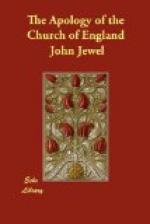But, good God, what manner of fellows be these which blame us for disagreeing? And do all they themselves, ween you, agree well together? Is every one of them fully resolved what to follow? Hath there been no strifes, no debates, no quarrels among them at no time? Why then do the Scotists and the Thomists, about that they call meritum congrui and meritum condigni, no better agree together? Why agree they no better among themselves concerning original sin in the Blessed Virgin? concerning a solemn vow and a single vow? Why say the canonists, that auricular confession is appointed by the positive law of man: and the schoolmen contrariwise, that it is appointed by the law of God? Why doth Albertus Pighius dissent from Cajetanus? Why doth Thomas dissent from Lombardus, Scotus from Thomas, Occamus from Scotus, Alliacensis [ed. 1564 Alliensis] from Occamus? And why do the Nominals disagree from the Reals? And yet say I nothing of so many diversities of friars and monks; how some of them put a great holiness in eating of fish, and some in eating of herbs; some in wearing of shoes, and some in wearing of sandals; some in going in a linen garment, and some in a woollen; some of them called white, some black; some being shaven broad, and some narrow: some stalking abroad upon pattens, some barefooted; some girt, and some ungirt. They ought, I wiss, to remember, how there be some of their own company which say, that the body of Christ is in His Supper naturally: contrary, other some of the self-same company deny it to be so. Again, that there be other of them, which say, the body of Christ in the Holy Communion “is rent and torn with our teeth:” and some again that deny the same. Some also of them there be, which write that the body of Christ is quantum in the Eucharistia; that is to say, hath his perfect quantity in the Sacrament; some other again say nay. That there be others of them which say Christ did consecrate




